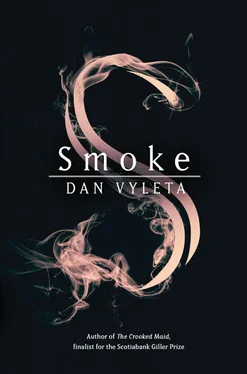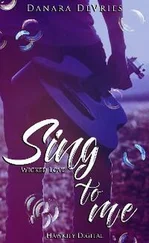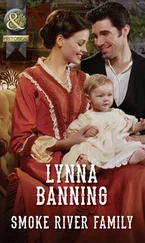Can a man such as I be seduced by a courtesy?
And so I lied to Livia. It made sense, ensured that she and the boys were safe from reproach. The lie came easily. What frightened me was how small was my capacity for shame.
ф
Berta emerges. She is shaking her head.
“It’s the top of her thighbone. I cannot set it. She needs a surgeon. If it infects—”
“There is a dog in the kitchen.”
“It went mad,” she answers, obscurely, as though that explains its presence. “I smoked and it went mad. Angry, snapping at me. But it was sad too. A mad dog with a broken heart.” She grimaces, shudders. “It seemed a mercy, Tobias.”
“I will get rid of it.”
“Leave it by the street corner. Someone will take it for its meat. It’s January. A hungry month.”
When I return, I look in on Lady Naylor. She remains awake, tucked under sheet and blanket, her dress draped over the backboard flaring its skirts.
Her eyes are wet with tears.
“My son is dead,” she whispers when I draw closer. “But my daughter loves me.”
I watch a shiver ripple through her frame, bend down to her mangled, bandaged face.
“Your Smoke,” I tell her. “When you said good-bye to your daughter. It looked different.” I search for the right word, cannot find it. “Weak. Thin. Reluctant.”
She nods, pulls away the blanket and displays her naked flank without shame. The scar is an ugly thing, rises mottled from her skin.
“He damaged me. When he cut me. I am almost as broken as you.
“It would be best if we both were dead,” she carries on. “We will give people ideas. Renfrew’s ilk.”
Then Berta is there, walks over to the bed and pulls the blanket back to cover her.
“You go on, die,” she tells Lady Naylor. “My son needs a father.”
ф
We spend the rest of the night at Mowgli’s bedside. The boy drifts in and out of sleep. His face is serious. At times he cries with some internal pain, quietly, not wiping the tears. I do it for him. He does not flinch at my touch.
In the periods when he sleeps, Berta and I talk. I try to describe to her what happened. Berta is not interested.
“I shot a man today,” I tell her. “I shot milady’s son.”
“What does it matter now? It’s over and done with. Mowgli’s here.”
“Miss Livia called me a monster. And then she would not look at me, not once.”
“She is young,” Berta says. “She has a narrow view of life.”
I nod, unconvinced.
“It’ll be dawn soon. We should get some sleep.”
But we stay. Mowgli wakes when light starts filling the room. His temperature is down, he is alert. Berta bends to him slowly, afraid she will startle him. His arm comes up, cautiously, his little hand grabbing at her face, her nose. It withdraws and displays between his index and middle fingers the little wedge of his thumb. Berta raises her hand to her face as though looking for her nose; mimes finding nothing there, only a blank; stares in mock terror at the boy’s raised-up thumb. He does something miraculous then. He giggles. And grabs for her nose once again.
Emotion pours out of Berta. It pours out as a sob, as pale, hazy Smoke. The child sees the Smoke, waves at it, finds he can dance shapes into it with the movement of his fingers.
And I?
I sit there abject, smiling, yearning to feel as they do; contented and removed.
He looks like a statue.”
“Like a saint. At prayer. Only, you know. Crucified.”
“And evil.”
But even as Charlie says it he realises it is not true. Julius is kneeling, arms out, his mangled face drooping halfway through the bars. It isn’t just that Thomas’s fists have cut loose his features. The Soot has come off where his temples and ears have slipped through the bars, along with something more substantial than skin. Livia is right then. Julius looks like a saint: whittled from a block of charcoal, or black burnt wood. Brittle to the touch.
Not that they have touched him yet. They are in awe of his death. He looks impossibly thin; the hands ready to snap off at the wrists, the shoulders sharp and angular. Only his stomach is oddly distended, half spherical, as though ready to burst with undigested Soot. Charlie watches Livia study him. She lifts her hand once, as though to rearrange him, then lets it drop again.
“He could have stepped through,” she says at last. “If his head fits, the rest would have, too. I wonder whether he realised.”
She frowns, steps forward suddenly, and takes hold of one arm and shoulder. A shifting of the weight, a twist, and Julius’s right shoulder and chest slide through the bars; the arm splayed out ahead of him, hand spread, the skin oddly white underneath the fingernails. His movement leaves a trail of tar along the iron of the bar.
They crouch down to him, Charlie and Livia. Thomas is behind them, a shadow watching from afar. Charlie wonders whether Livia wants to transport and bury her half brother; wonders, too, at the two other men lying beyond the barrier, out of reach. What she does, however, is unbutton Julius’s shirt. Charcoal skin, flaking off him; Soot and flesh fused. Charlie watches her touch Julius’s chest, recoil; pokes his own finger at the ribs, and feels it sink in to the knuckle.
“It’s like he is made of sin,” she mutters. Then: “You would have thought Mother would have noticed it. But she wouldn’t look at him. And she was in pain, in shock. It’s funny, I suppose. Crying over her failure. The means to reverse it a dozen steps behind her back.”
All at once, Charlie knows what she is thinking. It sends a shiver through him, gut-deep, of fear, of excitement; the burden of choice.
Revolution.
What young man has never dreamed of being its cause?
ф
Charlie stands, breathes. What is happening within him cannot be called thought. It has no words, for one thing, and knows no maths; does not calculate, but is simply the slow ascent of a decision already made, up from his centre to that sluggish organ that is his brain. He does not know how long it takes. His mouth, he notices, is full of Smoke.
Then he acts. Bends down to Julius, takes hold of his armpits, feels the brittle flesh move under his grip. Twists and pulls, trying to line up the shoulders, then the stomach and hips; that potbelly sticking, like a wine bladder pert with mud. Livia does not help him with his labour. Neither does Thomas; stands watching behind. Only when Julius’s thighs (emaciated; sticks of bone and black, the trousers torn beneath both knees) come sliding through, does Thomas step close. He pulls Charlie out of his crouch, looks him hard in the eye.
“What are you doing with him, Charlie?”
“You know what.”
Thomas stares at him, sniffs his breath.
“It’s catching then,” he decides. “You said it to Grendel. ‘An angel playing at vice.’ Charlie Cooper is going to change the world.” Thomas puckers his lips as though to spit, swallows it instead. “Are you going to scrape it off him, or just sink him in the pool?”
And Charlie stands there, listening to him, already connected to Thomas by fine tendrils of Smoke, chest to chest and hip to hip, his blood alive to a single truth. This is it, our duel. Who would have thought it would be like this? Me, kind, goodly Mr. Cooper, standing here, lighting the fuse. And he, the dark one, standing in my way. In another moment we will go at each other with our fists.
A duel.
Or else Livia will decide.
“You are afraid,” Charlie taunts Thomas. “We can make a difference, and you are shaking in your boots. I can smell it in your every breath.”
They are standing close now, have stepped into each other’s exhalations, too close even to throw a punch.
Читать дальше












